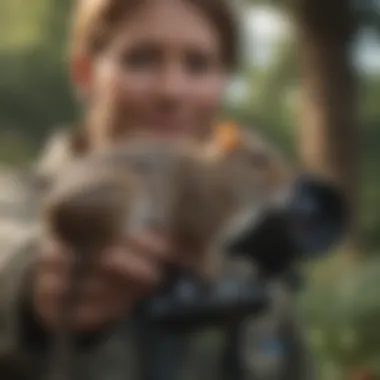Unveiling the Crucial Role of a Commercial Pest Control Technician in Business Operations


A commercial pest control technician plays a vital role in ensuring pest-free environments in business settings. This profession requires a unique set of skills and expertise to effectively manage and prevent pest infestations. The significance of pest control in commercial establishments cannot be understated, as pests can cause damage to property, contaminate products, and harm the reputation of businesses.
Responsibilities and Skills Required
Commercial pest control technicians are responsible for inspecting properties to identify pest issues, determining the appropriate treatment methods, and implementing pest management plans. They must have in-depth knowledge of different pests, their behavior patterns, and the most effective control techniques. Additionally, strong communication skills are essential to interact with clients, explain treatment options, and provide recommendations for preventing future infestations.
Importance of Pest Control in Commercial Settings
The importance of pest control in commercial settings lies in safeguarding public health, maintaining the integrity of businesses, and complying with hygiene regulations. Failure to address pest issues promptly can result in financial losses, legal repercussions, and damage to brand reputation. Commercial pest control technicians play a crucial role in protecting staff, customers, and assets from the negative impact of pest infestations.
Challenges Faced by Commercial Pest Control Technicians
Commercial pest control technicians encounter various challenges in their line of work, including resistance to pesticides, changing pest behavior due to environmental factors, and the need for continuous training to stay updated on industry best practices. Environmental concerns also play a significant role, requiring technicians to adopt eco-friendly pest control methods to minimize harm to non-target species and the surrounding ecosystem.
Future Trends in Commercial Pest Control
As the field of pest control continues to evolve, commercial pest control technicians are increasingly turning to integrated pest management (IPM) strategies that focus on long-term prevention and sustainable practices. Embracing technology, such as smart pest monitoring systems and digital reporting tools, allows technicians to enhance efficiency and accuracy in pest detection and treatment. Continuing education and collaboration with industry peers are essential for technicians to stay ahead of emerging pest control challenges and deliver effective solutions to their clients.
Introduction
In the realm of commercial pest control, the role of a pest control technician holds immense significance. This paramount position encompasses a multitude of responsibilities that directly impact the well-being of businesses and their environments. By effectively managing pest infestations, these technicians ensure the smooth functioning and reputation of commercial establishments. The ability to identify, assess, and eradicate pests is not just a job requirement but a critical element in upholding hygiene standards and safeguarding public health.
Overview of Commercial Pest Control
Defining Commercial Pest Control
Commercial pest control refers to the specialized service of managing and eliminating pests in business premises. This tailored approach considers the unique challenges and regulations faced by commercial settings, distinguishing it from residential pest control in its scope and techniques. The focus on minimizing disruptions to business operations while maintaining pest-free spaces marks the essence of commercial pest control.
Importance in Business Environments
The prominence of commercial pest control in business environments stems from its pivotal role in protecting assets, reputation, and profitability. A pest-infested workplace not only poses health risks to occupants but also tarnishes the company's image and may lead to financial losses. By investing in comprehensive pest control measures, businesses demonstrate a commitment to quality, safety, and sustainability.
Purpose of the Article
Highlighting the Role of Pest Control Technicians
By shedding light on the responsibilities and competencies of pest control technicians, this article illuminates the indispensable role they play in upholding pest management standards. From conducting meticulous inspections to devising tailored treatment plans, these professionals are pivotal in safeguarding business interests and ensuring regulatory compliance.
Educating on Commercial Pest Management
Through education on commercial pest management, this article aims to empower readers with insights into preventive strategies, pest behavior, and sustainable treatment options. By fostering a deeper understanding of pest control principles, business owners and professionals in the industry can make informed decisions and contribute to a healthier, pest-resistant environment.
Target Audience


Professionals in Pest Control Industry
Addressing professionals in the pest control industry, this section underscores the value of continuous learning and specialization in combating evolving pest threats. From honing technical expertise to adapting to industry trends, staying abreast with advancements is paramount for ensuring efficacy and credibility in pest control services.
Business Owners and Managers
For business owners and managers, awareness of commercial pest control practices is instrumental in fostering a safe and conducive work environment. Understanding the nuances of pest management enables proactive measures against infestations, promoting business sustainability and safeguarding against reputational risks.
Responsibilities of a Commercial Pest Control Technician
A commercial pest control technician plays a significant role in maintaining pest-free environments essential for businesses to function smoothly. Their responsibilities encompass various critical elements that contribute to the overall goal of pest management in commercial settings. One of the key benefits of a pest control technician's role is their ability to identify pest infestations accurately, which is crucial for devising effective eradication strategies and preventing further infestations. Assessing environmental factors is another vital aspect as it helps in understanding the conditions that promote pest breeding and survival. By evaluating these factors, technicians can tailor treatment plans to suit the specific needs of each business environment, ensuring efficient pest control.
Inspection and Assessment
Identifying Pest Infestations
Assessing Environmental Factors
Assessing environmental factors is crucial for understanding the conditions that support pest populations within a commercial setting. By considering factors such as temperature, moisture levels, and food sources available to pests, technicians can develop treatment plans that target the root causes of infestations. The key characteristic of this assessment lies in its ability to provide insights into the environmental triggers that attract and sustain pests, enabling technicians to implement proactive measures that discourage pest activity. While this process enhances the precision of pest control efforts, it also requires thorough attention to detail to accurately assess all relevant environmental factors.
Treatment Planning and Execution
Developing Pest Control Strategies
The development of pest control strategies is a fundamental aspect of a commercial pest control technician's role. It involves analyzing the information gathered during inspections to formulate customized pest management plans for each client. The key characteristic of this activity is its emphasis on proactive approaches that address current infestations while also preventing future pest problems. By developing comprehensive strategies based on pest biology and environmental factors, technicians can deliver long-term pest control solutions that safeguard businesses against potential threats. While this approach offers the advantage of tailored pest management, it requires continuous evaluation and adjustment to adapt to changing pest dynamics.
Implementing Treatment Methods
Implementing treatment methods is the practical application of the developed pest control strategies to eradicate pests effectively. This hands-on task involves the precise execution of treatment plans using appropriate chemicals or non-chemical methods. The key characteristic of this step is its direct impact on pest populations, as proper implementation ensures the successful elimination of pests from the targeted areas. A unique feature of this process is its reliance on knowledge and expertise to apply treatments safely and efficiently, minimizing risks to occupants and the environment. While implementing treatment methods promotes immediate pest control results, it also demands ongoing monitoring to verify treatment effectiveness and address any new pest activity.
Client Communication
Explaining Procedures to Clients
Effective client communication is essential for a commercial pest control technician to convey treatment plans and procedures to customers clearly. By explaining the rationale behind specific pest control measures and the expected outcomes, technicians can establish trust and collaboration with clients. The key characteristic of this communication is its ability to educate clients on the importance of each step in the pest control process, empowering them to participate in pest management efforts. A unique feature of this interaction is its role in promoting transparency and aligning client expectations with the reality of pest control outcomes, fostering long-term relationships based on mutual understanding.
Providing Recommendations for Prevention
In addition to explaining procedures, providing recommendations for prevention is a proactive aspect of client communication that helps businesses maintain pest-free environments. By suggesting preventive measures to address potential entry points, hygiene issues, or structural vulnerabilities, technicians assist clients in minimizing the risk of future infestations. The key characteristic of this service is its focus on holistic pest management through a combination of reactive treatments and preventive practices. A unique feature of offering prevention recommendations is its role in empowering clients to take ownership of their pest control outcomes and adopt practices that support long-term pest prevention strategies.
Skills and Qualifications
In the realm of commercial pest control, possessing the right skills and qualifications is paramount to ensuring effective management of pest infestations in business environments. The proficiency in technical and interpersonal skills equips a pest control technician to tackle various pest-related challenges efficiently. Technical skills comprise a solid understanding of pesticides and chemicals along with pest biology, enabling technicians to devise strategic pest control plans based on their knowledge of different substances and pest behaviors. Additionally, interpersonal skills such as effective communication and problem-solving abilities are crucial for client interactions and addressing pest control issues promptly and effectively. Certifications and training are vital in this field, as they validate a technician's competency. Being a licensed pest control operator demonstrates adherence to industry standards and regulations, instilling trust in clients regarding the technician's expertise in pest control. Meanwhile, continuing education requirements ensure technicians remain updated on the latest advancements in pest control techniques and technologies, further enhancing their skill set and service quality.
Technical Skills


Knowledge of Pesticides and Chemicals
A profound grasp of pesticides and chemicals is a foundational aspect of commercial pest control. The knowledge of different types of chemicals and their specific applications is fundamental in developing targeted and effective pest control strategies. Understanding the properties of pesticides and chemicals aids in selecting the most suitable products for specific pest infestations, ensuring maximum efficacy while minimizing environmental impacts. Technicians with expertise in this area can accurately assess the risks associated with different substances, enabling them to make informed decisions that align with safety protocols and regulatory requirements.
Understanding Pest Biology
Comprehending pest biology is an invaluable asset for pest control technicians as it allows them to predict and counteract pest behaviors effectively. By studying the life cycles, habits, and vulnerabilities of common pests, technicians can implement tailored pest management approaches that disrupt pests' reproductive cycles and habits. This knowledge facilitates the development of preventive measures that target the root causes of infestations, reducing the reliance on reactive pest control methods and promoting long-term pest management sustainability.
Interpersonal Skills
Effective Communication
Effective communication skills are essential for pest control technicians to convey complex information to clients in a clear and understandable manner. Being able to explain pest control procedures, treatment plans, and preventive measures cogently fosters trust and cooperation between technicians and clients. Moreover, effective communication facilitates the establishment of realistic expectations regarding results and timelines, ensuring transparency and clarity throughout the pest control process.
Problem-Solving Abilities
Possessing strong problem-solving abilities enables pest control technicians to adapt to dynamic pest control scenarios swiftly. When faced with unexpected challenges or changes in pest behavior, technicians with adept problem-solving skills can identify alternative solutions and implement them efficiently. The ability to analyze complex pest control situations systematically and devise innovative approaches enhances technicians' efficacy in addressing unique pest-related issues, fostering improved pest management outcomes.
Certifications and Training
Licensed Pest Control Operator
Becoming a licensed pest control operator is a testament to a technician's qualifications and competency in the pest control industry. This certification signifies that the technician has met the necessary standards and regulations set by relevant authorities, showcasing their professionalism and dedication to upholding quality pest control practices. Clients are more likely to trust licensed operators due to their demonstrated expertise and commitment to adhering to industry best practices, elevating the credibility and reliability of their pest control services.
Continuing Education Requirements
Continuing education is vital for pest control technicians to stay abreast of advancements in pest management techniques, technologies, and regulations. By fulfilling ongoing training requirements, technicians can expand their knowledge base, enhance their skill sets, and adapt to evolving pest control challenges effectively. Staying updated on the latest developments in pest control ensures that technicians can provide clients with the most innovative and efficient pest management solutions, reflecting a commitment to continual improvement and industry excellence.
Challenges in Commercial Pest Control
In the realm of commercial pest control, navigating through the challenges posed by various factors is paramount. These challenges not only act as hurdles that need to be overcome but also as learning opportunities to enhance the efficacy of pest management strategies. Understanding and addressing these challenges contribute significantly to the efficiency and success of pest control operations in commercial settings.
Regulatory Compliance
Navigating Local Regulations
Navigating local regulations stands out as a critical aspect of ensuring compliance and adherence to legal standards in commercial pest control. This facet entails deep-diving into the intricate details of regional laws and statutes governing pest management practices. By meticulously navigating through these regulations, pest control technicians can align their operations with legal requirements, thereby mitigating potential risks and liabilities. The careful adherence to local regulations not only fosters ethical practices but also builds trust with clients and regulatory bodies, positioning the pest control service provider as a responsible and reliable entity in the industry.
Adhering to Safety Standards
Adhering to stringent safety standards is non-negotiable in the realm of commercial pest control. It involves a steadfast commitment to implementing protocols and measures that prioritize the well-being of both clients and technicians. By adhering to these safety standards, pest control technicians uphold professionalism and demonstrate a dedicated approach to creating pest-free environments without compromising safety. The emphasis on safety not only safeguards against potential mishaps but also signifies a commitment to ethical practices and responsible pest management, resonating positively with clients and industry stakeholders.
Timeliness and Efficiency
Effective pest control in commercial settings hinges on the timely and efficient execution of services. Timeliness not only reflects professionalism but also plays a pivotal role in minimizing pest-related disruptions to business operations. Efficiency, on the other hand, underscores the ability to deliver results swiftly and effectively, thereby optimizing resource utilization and enhancing customer satisfaction.


Meeting Client Deadlines
Meeting client deadlines is a core component of customer-centric pest control services. This aspect involves meticulous planning, swift execution, and proactive communication to ensure that pest control interventions align with the operational schedules of clients. By meeting deadlines, pest control technicians instill confidence in their service delivery and establish a reputation for reliability and punctuality, key factors that influence long-term client relationships and business sustainability.
Ensuring Effective Pest Eradication
The essence of commercial pest control lies in the effective eradication of pests to safeguard human health and preserve property integrity. Ensuring effective pest eradication necessitates a comprehensive approach that addresses the root causes of infestations and deploys strategic pest management measures. By prioritizing the thorough elimination of pests, technicians not only fulfill their duty of protecting businesses but also contribute to maintaining hygienic and conducive work environments for clients.
Risk Assessment
Conducting rigorous risk assessments is a fundamental aspect of commercial pest control to identify and mitigate potential hazards that may arise during pest management activities. By proactively assessing risks, technicians can preemptively address safety concerns and implement preventive measures to safeguard all stakeholders involved in the pest control process.
Identifying Potential Hazards
Identifying potential hazards demands keen observation and preemptive action to address factors that could compromise the safety and efficacy of pest control operations. By discerning potential hazards such as chemical exposure risks or structural vulnerabilities, technicians can tailor their pest management strategies to minimize these threats and ensure a secure working environment for themselves and their clients.
Mitigating Health Risks
Mitigating health risks is a primary focus in commercial pest control to uphold the well-being of individuals exposed to pest management procedures. By implementing measures to mitigate health risks, such as using eco-friendly pest control products or conducting thorough assessments of potential health implications, technicians demonstrate a commitment to ensuring the health and safety of all parties involved. Prioritizing health risk mitigation not only enhances the credibility of pest control services but also cultivates a culture of responsibility and care within the industry.
Emerging Trends in Pest Control Technology
Integrated Pest Management
Environmental-Friendly Approaches
When discussing environmental-friendly approaches within Integrated Pest Management (IPM), it's crucial to understand their significant impact. The essence lies in utilizing methods that prioritize ecological balance and sustainability, steering away from harmful chemicals that pose risks to both humans and the environment. The key characteristic of these approaches is their ability to target pests selectively while safeguarding beneficial organisms and the ecosystem at large. This eco-conscious strategy offers long-term benefits, promoting a balanced coexistence between humans and nature.
Reducing Reliance on Chemicals
Reducing reliance on chemicals within IPM underscores the shift towards more sustainable and eco-friendly pest control measures. This shift is highly beneficial as it minimizes the detrimental effects of chemical pesticides on ecosystems, wildlife, and human health. By embracing alternative solutions such as biological controls and habitat modification, pest management becomes more holistic and less harmful to the environment. The unique feature of this approach lies in its ability to address pest issues effectively while preserving environmental integrity.
Remote Monitoring Systems
Real-Time Pest Detection
The real-time pest detection component of remote monitoring systems is a game-changer in pest control practices. By providing instantaneous alerts on pest activities, this feature enables prompt responses and targeted interventions. Its key characteristic is the ability to detect pest intrusions early, preventing substantial infestations and property damage. Advantages of this technology include proactive pest management, reduced reliance on routine inspections, and swift problem resolution.
Data-Driven Decision Making
Data-driven decision making revolutionizes pest control operations by leveraging insights obtained through continuous monitoring. This analytical approach enhances the precision and efficacy of pest management strategies by identifying trends, patterns, and potential risks. The key characteristic of this method is its reliance on empirical data to optimize pest control efforts and resource allocation. Incorporating data-driven decision making ensures strategic and informed choices, leading to more sustainable pest control outcomes.
Automated Treatment Techniques
Robotic Applications in Pest Control
Robotic applications in pest control mark a significant advancement in automation and precision targeting. These applications streamline and enhance pest control processes by deploying robotic devices for monitoring, trapping, and exterminating pests. The key characteristic of robotic applications is their efficiency in covering large areas and accessing hard-to-reach spaces, enabling thorough pest management. Advantages include increased operational efficiency, reduced labor costs, and minimized human intervention, leading to precise and effective pest control measures.
Precision Targeting of Infestations
Precision targeting of infestations underscores the targeted and localized approach to pest control, minimizing collateral damage and environmental impact. This technique precisely targets areas infested by pests, using minimal resources while maximizing effectiveness. Its unique feature lies in its ability to differentiate between harmful pests and beneficial organisms, allowing for targeted eradication. Advantages include reduced pesticide usage, lower ecological disruption, and enhanced pest control outcomes.



